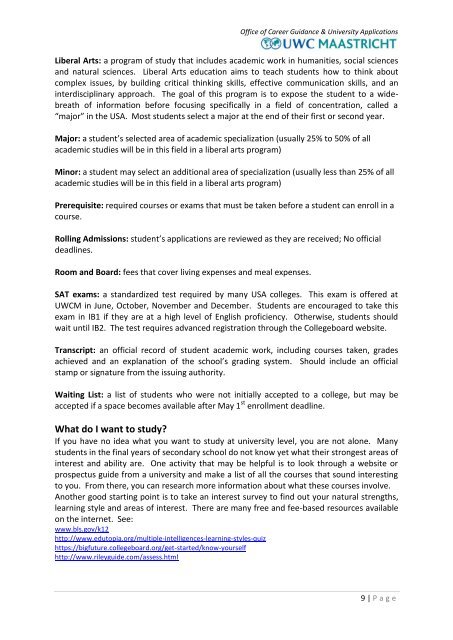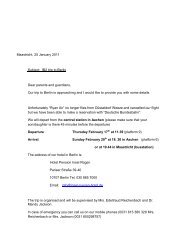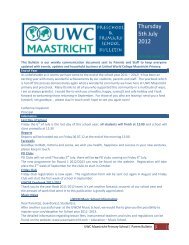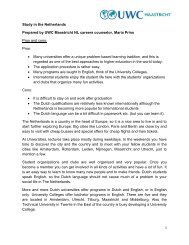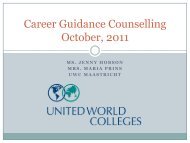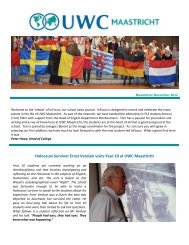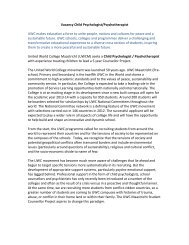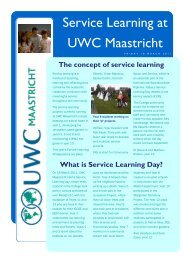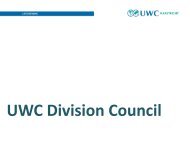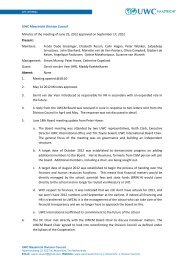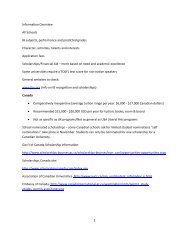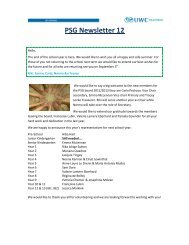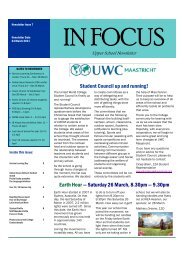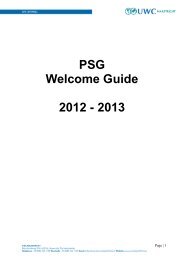Class of 2013 University Applications Handbook - UWC Maastricht
Class of 2013 University Applications Handbook - UWC Maastricht
Class of 2013 University Applications Handbook - UWC Maastricht
You also want an ePaper? Increase the reach of your titles
YUMPU automatically turns print PDFs into web optimized ePapers that Google loves.
Office <strong>of</strong> Career Guidance & <strong>University</strong> <strong>Applications</strong><br />
Liberal Arts: a program <strong>of</strong> study that includes academic work in humanities, social sciences<br />
and natural sciences. Liberal Arts education aims to teach students how to think about<br />
complex issues, by building critical thinking skills, effective communication skills, and an<br />
interdisciplinary approach. The goal <strong>of</strong> this program is to expose the student to a widebreath<br />
<strong>of</strong> information before focusing specifically in a field <strong>of</strong> concentration, called a<br />
“major” in the USA. Most students select a major at the end <strong>of</strong> their first or second year.<br />
Major: a student’s selected area <strong>of</strong> academic specialization (usually 25% to 50% <strong>of</strong> all<br />
academic studies will be in this field in a liberal arts program)<br />
Minor: a student may select an additional area <strong>of</strong> specialization (usually less than 25% <strong>of</strong> all<br />
academic studies will be in this field in a liberal arts program)<br />
Prerequisite: required courses or exams that must be taken before a student can enroll in a<br />
course.<br />
Rolling Admissions: student’s applications are reviewed as they are received; No <strong>of</strong>ficial<br />
deadlines.<br />
Room and Board: fees that cover living expenses and meal expenses.<br />
SAT exams: a standardized test required by many USA colleges. This exam is <strong>of</strong>fered at<br />
<strong>UWC</strong>M in June, October, November and December. Students are encouraged to take this<br />
exam in IB1 if they are at a high level <strong>of</strong> English pr<strong>of</strong>iciency. Otherwise, students should<br />
wait until IB2. The test requires advanced registration through the Collegeboard website.<br />
Transcript: an <strong>of</strong>ficial record <strong>of</strong> student academic work, including courses taken, grades<br />
achieved and an explanation <strong>of</strong> the school’s grading system. Should include an <strong>of</strong>ficial<br />
stamp or signature from the issuing authority.<br />
Waiting List: a list <strong>of</strong> students who were not initially accepted to a college, but may be<br />
accepted if a space becomes available after May 1 st enrollment deadline.<br />
What do I want to study?<br />
If you have no idea what you want to study at university level, you are not alone. Many<br />
students in the final years <strong>of</strong> secondary school do not know yet what their strongest areas <strong>of</strong><br />
interest and ability are. One activity that may be helpful is to look through a website or<br />
prospectus guide from a university and make a list <strong>of</strong> all the courses that sound interesting<br />
to you. From there, you can research more information about what these courses involve.<br />
Another good starting point is to take an interest survey to find out your natural strengths,<br />
learning style and areas <strong>of</strong> interest. There are many free and fee-based resources available<br />
on the internet. See:<br />
www.bls.gov/k12<br />
http://www.edutopia.org/multiple-intelligences-learning-styles-quiz<br />
https://bigfuture.collegeboard.org/get-started/know-yourself<br />
http://www.rileyguide.com/assess.html<br />
9 | P a g e


